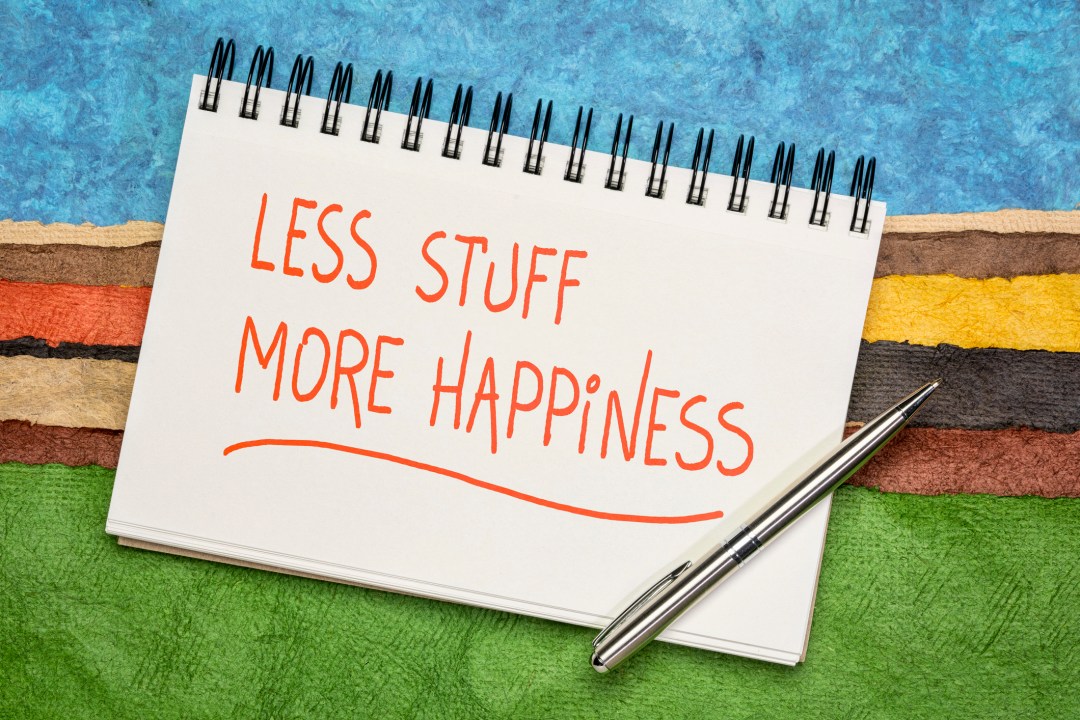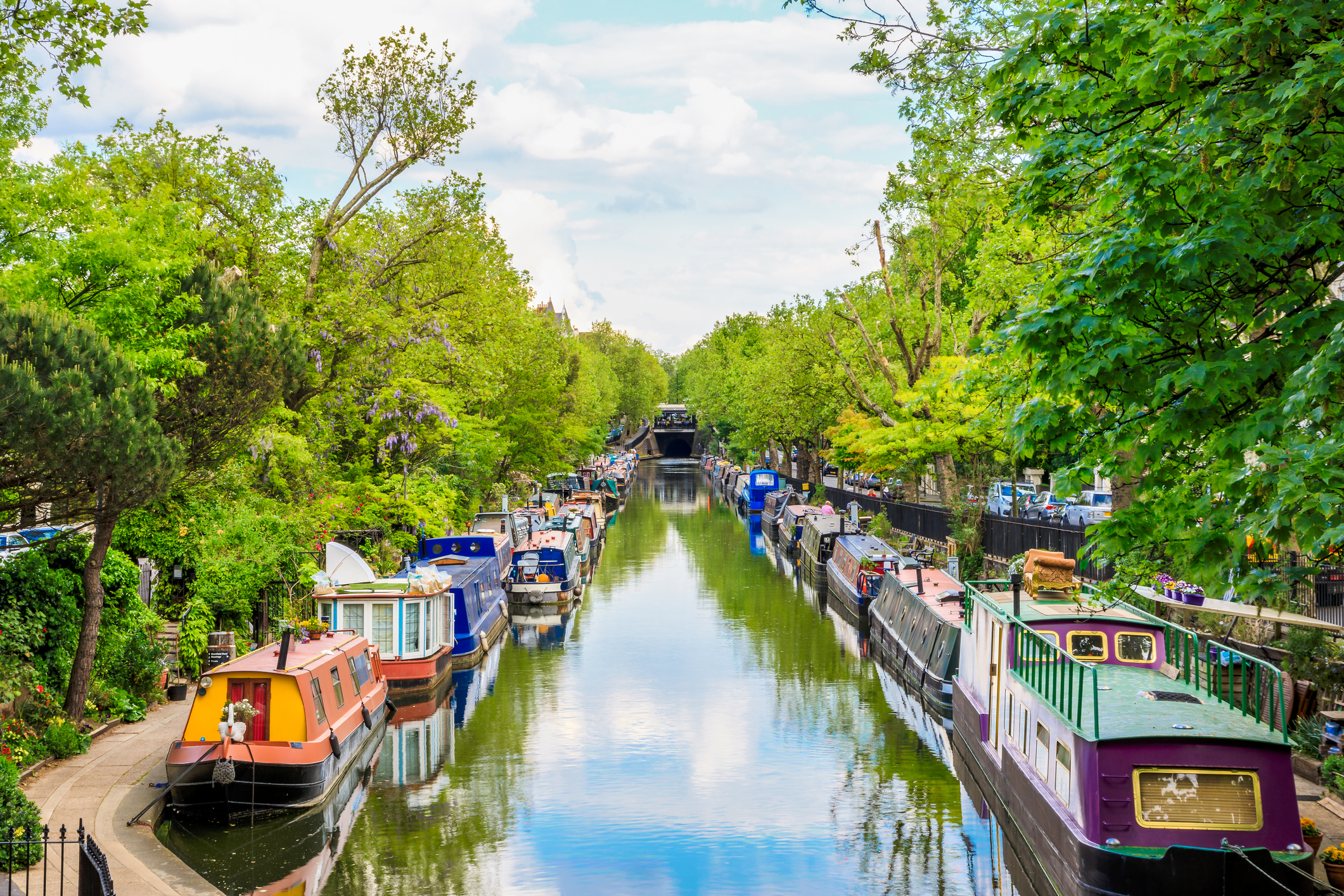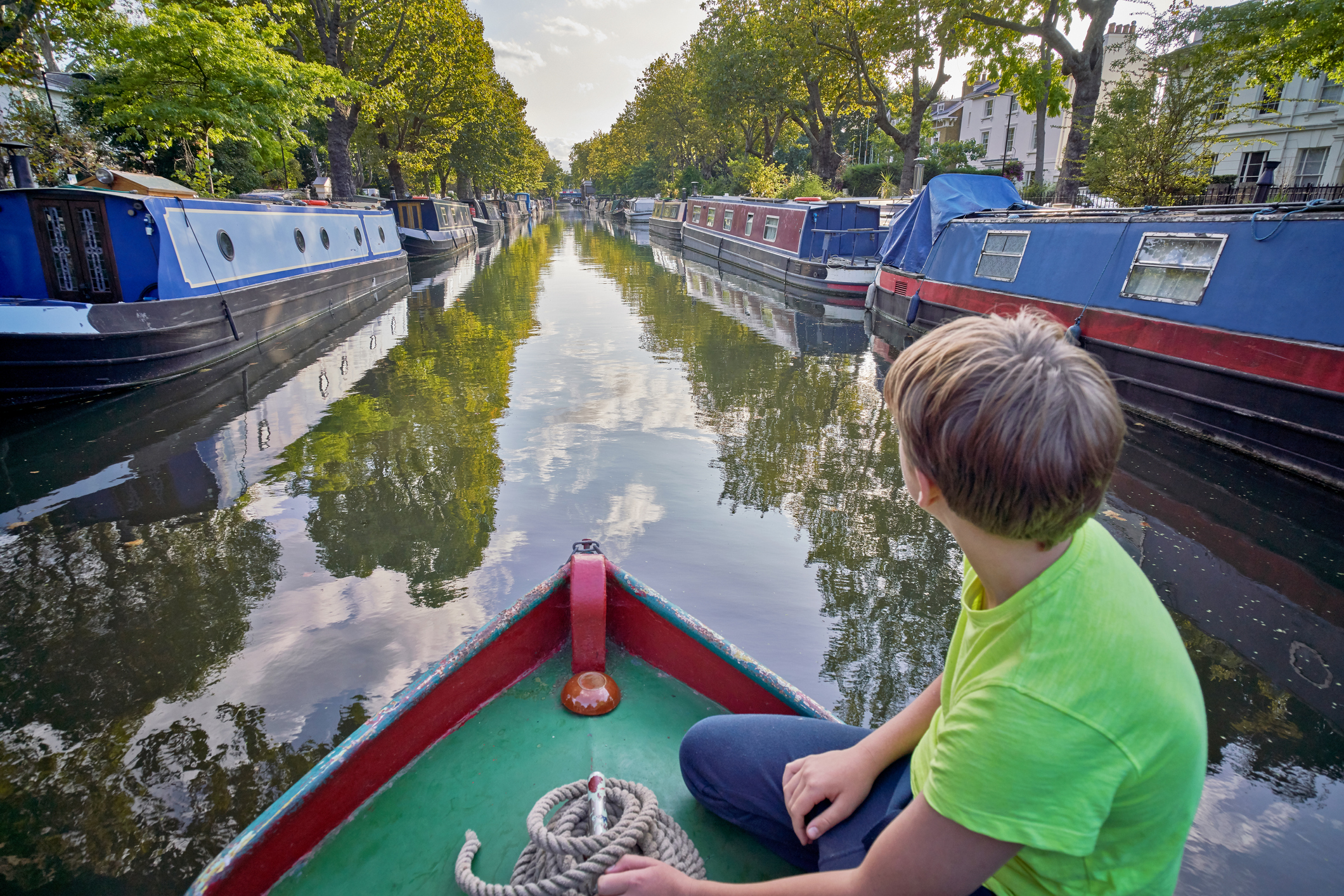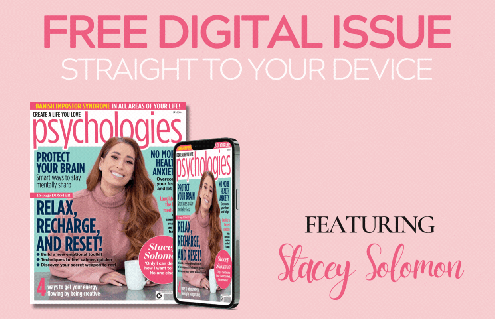How to simplify your life
Editor-in-Chief Suzy Walker shares the life lessons she learned when she downsized from a three-bedroom house to a tiny canal boat. She invites you to experiment with minimalism, discard what no longer serves you and identify and make room for what you truly want.

Goodbye things, hello life
Last summer, I scaled down from a roomy three-bedroom cottage in Sussex, with a garden and shed, to a 46-foot by six-foot canal boat in a London dock.
My son had just finished his GCSEs and had been offered a place at a sixth form in the city that specialised in his passion, film. From our Sussex home, it would have meant an exhausting four-hour daily commute for him. I am a single parent, my son is the most important person in my life and I wanted to support him. I also realised that I only had a couple of years left before he moves out, and I wanted to spend as much time with him as possible before he flies the nest.
The only way I could afford to move back to London, where the rents are sky-high, was to rent out my cottage and move onto a boat in King’s Cross. I had to rent out my house unfurnished, which was the opportunity to have an epic declutter to avoid paying a fortune for storage space. I’ve always been fascinated by documentaries about the tiny house movement – people living in shipping containers and cabins – and had flirted with minimalism for years, but I always felt too messy and disorganised to follow through. Little did I know that my decluttering plans would require me to dig deep, into way more than the back of the cupboard under the stairs, and embark on a self-development journey that has been profound and life-changing. It has changed my view of the world
Lessons I learned when I made space for them
FORGIVE YOURSELF
As I started to make an inventory of what I wanted to keep and what I wanted to discard, I felt a huge sense of shame and failure. I’ve always tried to be eco-conscious and am conscientious about self-development and enthusiastic about creative projects. As I lined up knitting needles, balls of wool and spiralisers, and tripped over unread self-help books that teetered in piles around my bed, I was struck by how much energy, time and money I’d wasted.
We’re proud of our eco pages in the magazine and I’m becoming more aware of how we have plundered our beautiful planet. Wasting these resources felt like a crime against nature. Plus, my main moan was that I felt overwhelmed, so perhaps I should stop trying to learn how to knit, make courgette noodles and write five novels and a screenplay all at the same time? I was wasting my resources as well as the earth’s.

“We strut over possessions as if our existence is defined by them. We think happiness comes from things”
Wait! I know this already
This was not the first time I had done an epic declutter. The first was more than 30 years ago. My parents died of cancer in quick succession when I was a teenager. My brother was in the navy, had come home for my mother’s funeral and we had to empty the family home. A lifetime of my parents’ stuff gone, given away, sent to the auction house in the space of 48 hours.
I realised then that possessions mean nothing at the end of your life. We come into the world with nothing and leave with nothing but, in our brief moment on life’s stage, we strut and fret over possessions as if our existence is defined by them. We think happiness comes from things but, if anything, they often lead to misery.
Few people can look back on a life preoccupied with the accumulation of wealth and honestly conclude ‘that was a life worth living’, said Bruce Hood, professor of psychology and author of Possessed: Why We Want More Than We Need (Allen Lane, £20). I agreed wholeheartedly – which left me, three decades after my parents’ deaths, wondering: had I learned nothing?
‘Chief forgiveness officer is my alternative title,’ said Katherine Blackler of the Association of Professional Declutterers & Organisers. ‘Decluttering is often a process of coming to terms with the decisions or projects in your life that haven’t worked out. You may have had the best of intentions – wanting to lose weight, so you buy exercise equipment, or hoping to start a new hobby but never quite following through. It’s easy to be harsh and judgmental, but you need to be gentle and have compassion for yourself.’
FOCUS ON THE WHY
Looking at my life gently and compassionately, I would say I have been on a quest to find fulfilment, not just buying random stuff. I realised at a young age that people, love and making the most of every minute were my priorities. I knew that if a house, car and things weren’t going to hit the spot, I had to discover what would. In my 20s, I partied like a rock star, but I also learned how to meditate, walked over hot coals and went wild swimming in cold seas way before Instagram made it trendy.
So how come I still had so much decluttering to do? As I looked at the piles of things I wanted to get rid of, I could see that I hadn’t just been buying stuff for stuff’s sake, I had been trying to do too much: I took up a shiny new hobby every month, always had a creative writing project under way, was forever trying to learn how to cook, and constantly reading books that would help me connect more with myself, with others, with The Force. But it had become a compulsion and I was too busy and overwhelmed to enjoy my life because I was trying to cram in too much. It was time to get clear about how I wanted to spend my time, my energy and my money; to distil what I really wanted in order to find the fulfilment that I craved.
Overfed on junk
I turned to ‘The Minimalists’, Joshua Fields Millburn and Ryan Nicodemus, for inspiration.
Bloggers and authors of the bestselling Minimalism: Live A Meaningful Life (Asymmetrical Press, £7.99), they had hit the age of 30 and achieved everything that was supposed to make them happy: careers with six-figure salaries, luxury cars, oversized houses and ‘all the stuff to clutter every corner of our consumer-driven lives’. ‘But we weren’t satisfied,’ they said.
‘There was a gaping void and working 80 hours a week just to buy more stuff didn’t fill it. In fact, it only brought more debt, stress, anxiety, fear, loneliness, guilt, overwhelm and depression.’ The answer, they told me, does not lie in decluttering but in asking better questions.
‘We all know how to declutter. You start small: focus on one room at a time, making progress each day as you work towards a simplified life. People should be much more concerned with the why – the purpose behind decluttering – than what has to go.
Ultimately, it has to do with the benefits you’ll experience on the other side. ‘Decluttering is not the end result – it is the first step. You don’t become instantly happy and content by getting rid of your stuff, at least not in the long run. Decluttering doesn’t work like that. If you simply embrace the what without the why, you’ll get nowhere.
It is possible to get rid of everything you own and still be utterly miserable.’ If we’re honest, said Hood, for many of us, possessions are about status and proving our worth to society. ‘The more we have, the more worthwhile we feel. This is wrong for a number of reasons, if not for the simple fact that ownership comes at a cost to society. Science tells us that the relentless pursuit of possessions is unfulfilling and, for some, creates more unhappiness in the long term. We should live simpler, less cluttered and less competitive lives. Unfortunately, it’s only at the end of our lives that we come to this realisation,’ he added.
An audit of the heart
What if we stopped doing that? What if we didn’t value or define ourselves by a house, car or possessions – how would we measure our worth? I unearthed an old coaching exercise that asked some bold questions:
What if everything you have was taken away?
What if all you had left was yourself?
How would that make you feel?
What would you have that is actually of value?
What are your strengths?
What is important to you?
How would you value yourself if you stopped comparing yourself to others?
How do you value and judge others?
Imagine you walked into a room, everyone was dressed the same and you could not discuss what others did for a living or where they lived or what they owned – how would you decide whether you liked them or not? Would it be about their humour, intelligence or creativity? What do you value in others? What do you value in yourself? On this, the crux of the matter, The Minimalists added: ‘By all means, start your decluttering project, but you need to do the deeper work by asking: When did I give so much meaning to possessions? What is truly important in life? Why am I discontent? Who is the person I want to become? How will I define my success?’

“We make room for more time, passion, creativity, experiences, contentment and freedom”
TIME IS THE CURRENCY OF OUR LIVES
My definition of success is a life built on love, growth and learning. And, when I asked these questions, I realised that what I wanted more than anything was more space and time in my life so I could give my full beam of attention to the people I love. Plus, I wanted enough time to go to an evening class once a week to learn how to knit/cook/write a novel, and actually finish a project. I wanted to be able to enjoy the present without feeling rushed and exhausted. Time is the currency of our lives. I had been spending it recklessly and was dangerously close to bankruptcy.
To see my way clear, Blackler advised me to make a vision board out of words and pictures. ‘Imagine you’ve finished your declutter and you’re living the life you want… How does it feel? How does it look? It’s important to motivate yourself with the end goal and the bigger vision. This is not about getting rid of your old clothes and books – decluttering is about creating a new plan for your life,’ she said.
The Minimalists agreed. ‘People think minimalism is about getting rid of material possessions: eliminating; jettisoning; extracting; detaching; decluttering; paring down; letting go… But that’s a mistake. True, removing the excess is an important part of the recipe – but it’s just one ingredient. If we’re concerned solely with the stuff, we’re missing the larger point. Minimalists don’t focus on having less, less, less; we focus on making room for more: more time, more passion, more creativity, more experiences, more contribution, more contentment, more freedom.
Clearing the clutter from life’s path helps make that room. Minimalism is the thing that gets us past the things, so we can make room for life’s important things – which actually aren’t things at all.’
Expect the unexpected
I grabbed some magazines from the recycling pile and started ripping out images and words that represented what was important to me. I wanted space, calm, peace, love and fun. I wanted to do less and be still.
My vision board was filled with open skies and birds flying. Yes, last summer, I kept taking stuff to the charity shop, but I also started to look at my diary to make space and time for me. I started to cancel meetings, be choosy about nights out and step back from a few extracurricular commitments.
Over six weeks, I went to the charity shop 26 times and packed my life into seven boxes, three suitcases and a basket of pans. We now live very simply on a canal boat in central London. Life is definitely slower. I meet my son at the station most days on my daily walk and we chat about school and life. Our space is so small we’re certainly around each other more.
My change of location has also brought me a new tribe – the boating community is creative, kind and interesting. I was asked out on a date by a handsome man and now I have a boyfriend. I’ve just finished a short creative writing course and I’ve been inspired to write a book… About when I made the leap one summer, downsized and moved onto a canal boat. And I have the time to start writing it.
Subscribe to Psychologies, the number one mindful living magazine in the UK and gain access to free coaching courses every month, join our kind community and be inspired every day with our FREE live online events with some of the best experts in the world.Subscribe here:
Image: Getty Images








